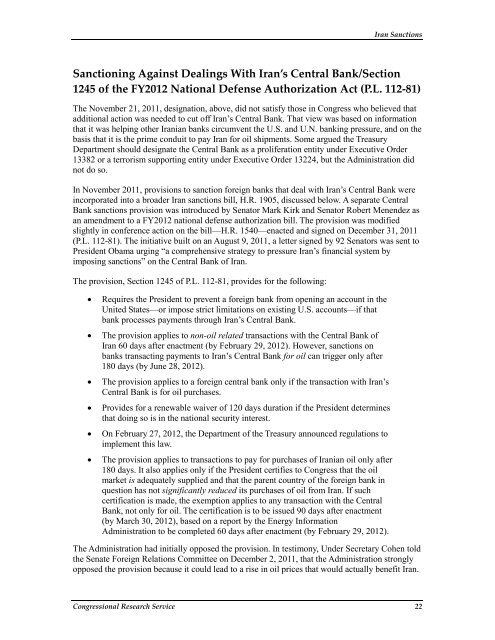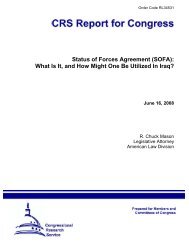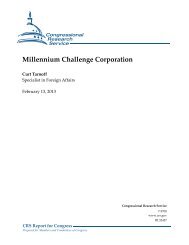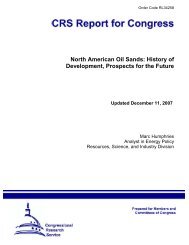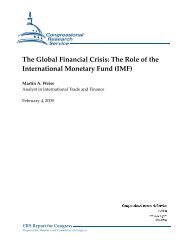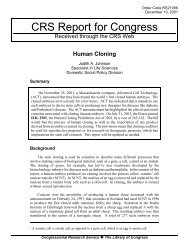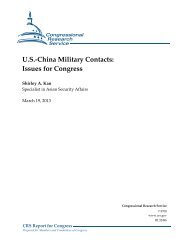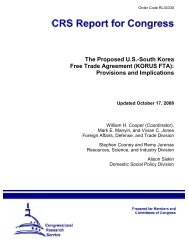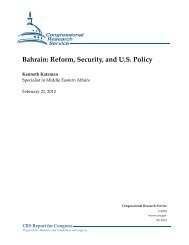Iran Sanctions - Foreign Press Centers
Iran Sanctions - Foreign Press Centers
Iran Sanctions - Foreign Press Centers
Create successful ePaper yourself
Turn your PDF publications into a flip-book with our unique Google optimized e-Paper software.
<strong>Iran</strong> <strong>Sanctions</strong><br />
Sanctioning Against Dealings With <strong>Iran</strong>’s Central Bank/Section<br />
1245 of the FY2012 National Defense Authorization Act (P.L. 112-81)<br />
The November 21, 2011, designation, above, did not satisfy those in Congress who believed that<br />
additional action was needed to cut off <strong>Iran</strong>’s Central Bank. That view was based on information<br />
that it was helping other <strong>Iran</strong>ian banks circumvent the U.S. and U.N. banking pressure, and on the<br />
basis that it is the prime conduit to pay <strong>Iran</strong> for oil shipments. Some argued the Treasury<br />
Department should designate the Central Bank as a proliferation entity under Executive Order<br />
13382 or a terrorism supporting entity under Executive Order 13224, but the Administration did<br />
not do so.<br />
In November 2011, provisions to sanction foreign banks that deal with <strong>Iran</strong>’s Central Bank were<br />
incorporated into a broader <strong>Iran</strong> sanctions bill, H.R. 1905, discussed below. A separate Central<br />
Bank sanctions provision was introduced by Senator Mark Kirk and Senator Robert Menendez as<br />
an amendment to a FY2012 national defense authorization bill. The provision was modified<br />
slightly in conference action on the bill—H.R. 1540—enacted and signed on December 31, 2011<br />
(P.L. 112-81). The initiative built on an August 9, 2011, a letter signed by 92 Senators was sent to<br />
President Obama urging “a comprehensive strategy to pressure <strong>Iran</strong>’s financial system by<br />
imposing sanctions” on the Central Bank of <strong>Iran</strong>.<br />
The provision, Section 1245 of P.L. 112-81, provides for the following:<br />
• Requires the President to prevent a foreign bank from opening an account in the<br />
United States—or impose strict limitations on existing U.S. accounts—if that<br />
bank processes payments through <strong>Iran</strong>’s Central Bank.<br />
• The provision applies to non-oil related transactions with the Central Bank of<br />
<strong>Iran</strong> 60 days after enactment (by February 29, 2012). However, sanctions on<br />
banks transacting payments to <strong>Iran</strong>’s Central Bank for oil can trigger only after<br />
180 days (by June 28, 2012).<br />
• The provision applies to a foreign central bank only if the transaction with <strong>Iran</strong>’s<br />
Central Bank is for oil purchases.<br />
• Provides for a renewable waiver of 120 days duration if the President determines<br />
that doing so is in the national security interest.<br />
• On February 27, 2012, the Department of the Treasury announced regulations to<br />
implement this law.<br />
• The provision applies to transactions to pay for purchases of <strong>Iran</strong>ian oil only after<br />
180 days. It also applies only if the President certifies to Congress that the oil<br />
market is adequately supplied and that the parent country of the foreign bank in<br />
question has not significantly reduced its purchases of oil from <strong>Iran</strong>. If such<br />
certification is made, the exemption applies to any transaction with the Central<br />
Bank, not only for oil. The certification is to be issued 90 days after enactment<br />
(by March 30, 2012), based on a report by the Energy Information<br />
Administration to be completed 60 days after enactment (by February 29, 2012).<br />
The Administration had initially opposed the provision. In testimony, Under Secretary Cohen told<br />
the Senate <strong>Foreign</strong> Relations Committee on December 2, 2011, that the Administration strongly<br />
opposed the provision because it could lead to a rise in oil prices that would actually benefit <strong>Iran</strong>.<br />
Congressional Research Service 22


